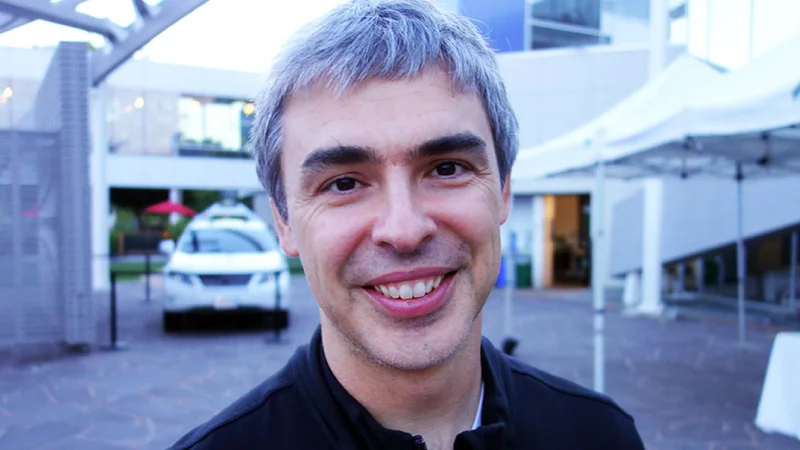Larry Page Becomes 2nd Richest Person in the World: The Visionary's Staggering Net Worth, His Legacy, and the New Tech Titans Hierarchy
The AI Tsunami: How Google's Founders Are Riding a Wave That's Reshaping Reality (And Your Future)
When I first saw these numbers flash across my screen, I honestly just sat back in my chair, speechless. It wasn’t just the staggering figures, though they're certainly jaw-dropping. It was what they represent: a seismic shift in how wealth is created, how power is consolidated, and frankly, how our future is being built, right before our very eyes. Larry Page, one of Google's brilliant co-founders, has rocketed to become the second-richest person on the planet, with a net worth now pushing past the quarter-trillion dollar mark. Right behind him, his partner-in-innovation, Sergey Brin, has leapfrogged Jeff Bezos to claim the fourth spot. Google co-founder Larry Page becomes second richest person in the world, Sergey Brin overtakes Jeff Bezos Elon Musk still holds the top, but the story here isn't just about who's got the most zeros in their bank account; it's about the relentless, unstoppable force that’s propelling them: Artificial Intelligence.
The New Titans of Tomorrow
Think about it: Alphabet, the behemoth parent company of Google, is now staring down a $4 trillion market capitalization. That's not just a big number; it's a testament to the sheer, unadulterated power of innovation. This isn't some slow, steady climb; we're talking about a rocket launch fueled by pure AI ambition. The recent surge? It’s directly tied to victories like the Google Chrome case, yes, but more profoundly, it's the market's roaring endorsement of their AI advancements. We’re talking about Google Gemini 3.0, which has everyone in the industry buzzing, and groundbreaking models like Nano Banana Pro for AI image generation. When even Salesforce CEO Marc Benioff is out there on X, openly praising Gemini’s performance, you know something fundamental has changed. Investors are piling in, and why wouldn't they? Alphabet stock is up a mind-bending 68% this year, making it the MVP of 2025’s AI mania.
And then there's the chatter about Meta Platforms, Inc. in talks to use Google’s Tensor Processing Units (TPUs) for training their own AI models. Now, for those of you who aren't knee-deep in silicon, TPUs are Google's custom-designed chips, purpose-built for AI workloads—in simpler terms, they're the specialized engines that make these complex AI systems run at lightning speed. This isn’t just a deal; it's a strategic alliance that signals Google's AI infrastructure is becoming the backbone for other tech giants. It’s like watching the early days of the internet, but on steroids, with every major player recognizing that Google's AI platform is the superhighway everyone needs to be on. It makes you wonder, doesn’t it: if the very tools of AI are becoming this valuable, what does that mean for the next wave of innovation? What kind of breakthroughs will emerge when even competitors are building on your foundation?

Beyond the Billions: What This Really Means for Us
This isn't just a financial story; it’s a human one. Larry Page and Sergey Brin co-founded Google in a Stanford dorm, solving a search problem that seemed simple at the time. Now, their vision, particularly Page’s substantial stake in Alphabet (he holds significantly more shares than Brin, partly due to Brin’s incredible philanthropic efforts, donating hundreds of millions to Parkinson's research and other causes), has propelled them into an echelon of wealth that few could have ever imagined. It’s a powerful reminder that while the pursuit of technological progress can create immense personal fortune, it also carries immense responsibility. With great power, or in this case, great wealth derived from world-changing technology, comes the imperative to steer it towards a future that benefits everyone, not just a select few.
You can almost hear the hum of millions of servers, the silent symphony of algorithms working, shaping our news feeds, our searches, our very interactions with the digital world. This isn't just about search anymore; it's about anticipation, prediction, and creation. We're witnessing a pivotal moment, much like the dawn of the printing press or the advent of electricity, where a new technology isn’t just improving existing systems but fundamentally rewriting the rules of what’s possible. Some might point to past failures, like Page's "flying car" ventures, as cautionary tales, but I see them as necessary detours on the path to true innovation. The speed of this is just staggering—it means the gap between today and tomorrow is closing faster than we can even comprehend, and it’s being driven by these visionary minds. The collective excitement is palpable; I see it in the online forums, the Reddit threads where people are debating the implications of Gemini 3.0, not just for Google, but for every industry, every aspect of our lives. It’s a wild, exhilarating ride, and we’re all strapped in.
Our AI-Powered Dawn Has Just Begun
This isn’t the peak; it’s merely the beginning of an entirely new era. The wealth generated, the market caps shattered, the technological leaps — they’re all indicators that we're standing at the precipice of a future so profoundly shaped by AI that we can only glimpse its outlines. Larry Page and Sergey Brin aren't just billionaires; they are architects of the next digital age, and their soaring fortunes are a direct reflection of the unprecedented value AI is unleashing upon the world. Get ready, because the true revolution is only just warming up.
